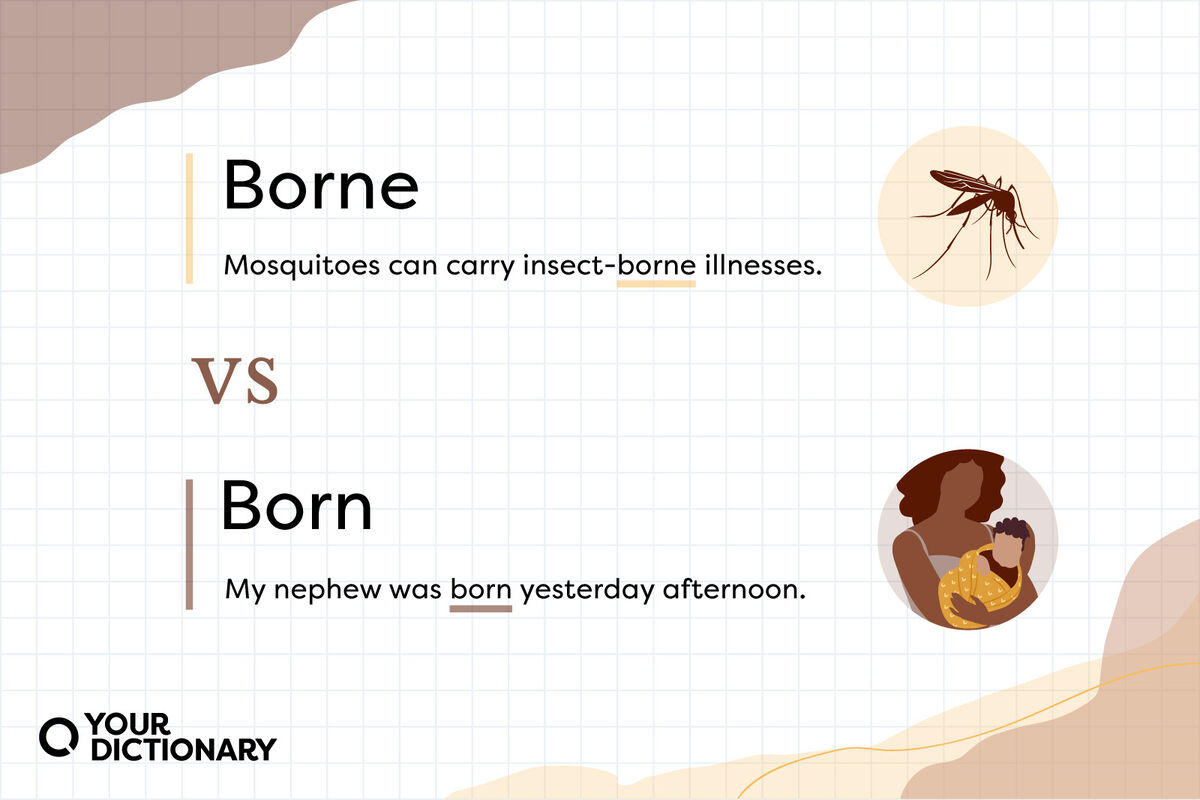
Is it food-born illness or food-borne illness? Does your birthday mark the day you were born or the day you were borne? Despite these words being pronounced (and nearly spelled) the same way, they do have different meanings.
Born vs. Borne
The difference between born and borne isn't as tricky as it seems. Born is the correct term for a baby who was just born, while borne is a word that means "carried."
| Word | Meaning | Example |
| born | birthed | The baby cubs were born yesterday. |
| borne | carried |
Malaria is a mosquito-borne illness. |
Born Means Birth
You're probably more familiar with the word born, which means "brought into the world from birth." It's a past participle of the verb "to bear" when specifically describing a woman bearing a child.
Explore examples of how to correctly use born in a sentence:
- Your birthday celebrates the day you were born.
- When my sister was born, I was suddenly a big brother.
- Maya helped the mother cat after her kittens were born.
Born as an Adjective
Like all participles, born can also function as an adjective to describe more about a noun or another adjective. Some examples of using born as an adjective include:
- Raphael's Italian-born mother moved to the United States when she was a child.
- My grandmother was a born leader.
- Even though I was born poor, I had many advantages in life.
Borne Means Carried By
Borne is a past participle of the verb "to bear," meaning "to carry" or "to transmit." Borne can also mean "to endure."
- Listeria is a food-borne illness that can make you very sick.
- The flu is an example of an airborne disease.
- The company has borne financial losses for years.
When Does Borne Describe Giving Birth?
In some cases, borne has a birth connotation, but only when describing the mother. It has a past perfect use that describes the mother carrying the child as well as giving birth. Some examples of using borne in a sentence include:
- My mother had borne three daughters before she gave birth to me.
- News spread that the queen finally had borne a son.
- When we heard that my sister had borne her first child, we called her immediately.
Tricky Phrases Using Born vs. Borne
The biggest cause for confusion when using borne vs. born are the colloquial phrases "born out of" and "borne out." Just like born and borne, they are almost the same — but not quite.
| Phrase | Meaning | Example |
| born out of | figuratively given birth | Our love was born out of friendship. |
| borne out | confirmed or proven | My theory was borne out by the results of the experiment. |
How to Remember the Difference
The easiest way to remember the difference between borne and born is by remembering the word childbirth. Do you see an "e?" There isn't one — just like there's no "e" in born, which is the word you use when describing childbirth.
Another way to remember the difference is to think of the word borne carrying the letter "e," just like an insect would carry an insect-borne illness. That should help you remember that borne means "to carry!"
More Confusing Homophones
Borne and born are homophones, which means that they sound the same but are spelled differently and have different definitions. Homophones are great poetic devices, but they can be confusing when you're trying to choose the correct word. Clear up more homophone misunderstandings with these tips on telling the difference between cite vs. site vs. sight.